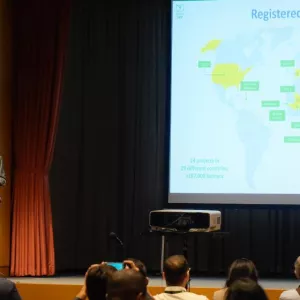Sustainable Rice Platform presents achievements in promoting clean and green rice production for the past 12 years
The Sustainable Rice Platform (SRP) Symposium at the 6th International Rice Congress discussed the accomplishments of SRP, its members, and partners, including the UN Food and Agriculture Organization (FAO), World Business Council for Sustainable Development (WBCSD), Deutsche Gesellschaft für Internationale Zusammenarbeit (GIZ), and national agricultural research and extension systems, over the past 12 years. The event, supported by the Asian

Sustainable Rice Platform presents achievements in promoting clean and green rice production for the past 12 years
The Sustainable Rice Platform (SRP) Symposium at the 6th International Rice Congress discussed the accomplishments of SRP, its members, and partners, including the UN Food and Agriculture Organization (FAO), World Business Council for Sustainable Development (WBCSD), Deutsche Gesellschaft für Internationale Zusammenarbeit (GIZ), and national agricultural research and extension systems, over the past 12 years. The event, supported by the Asian Development Bank (ADB), was attended by rice value chain stakeholders from all over the world.
One of the primary roles of SRP is the development and dissemination of the SRP Standard for Sustainable Rice Cultivation. This is the world’s first voluntary sustainability standard for rice cultivation that recommends guidelines for farm management, water use, pest management, nutrient management, harvest and post-harvest practices, and labor practices. SRP recently announced the launch of its Assurance Scheme version 2.0 which updates the verification processes and fees and enhances their data integrity and monitoring.
During the event, outcomes of some of the 24 Registered SRP Projects in 19 different countries were presented which together reached more than 187,000 farmers globally and aimed to promote the adoption of sustainable best practices and provide links to markets.
The event also addressed pertinent issues on sustainability in the rice sector by fostering synergies between market-led and development-driven approaches which are underpinned by a network driven by a common cause.
“Rice supply is expected to drop by nearly 20% due to climate change by 2050”, said SRP Board Chair Keith Jones. “At the same time, production needs to increase by 25% to meet global demand. Because of this, there is an increasing demand for adopting sustainable technologies and practices as production intensifies worldwide.”
Business has an important role in decarbonizing rice value chains by being actively involved in…

